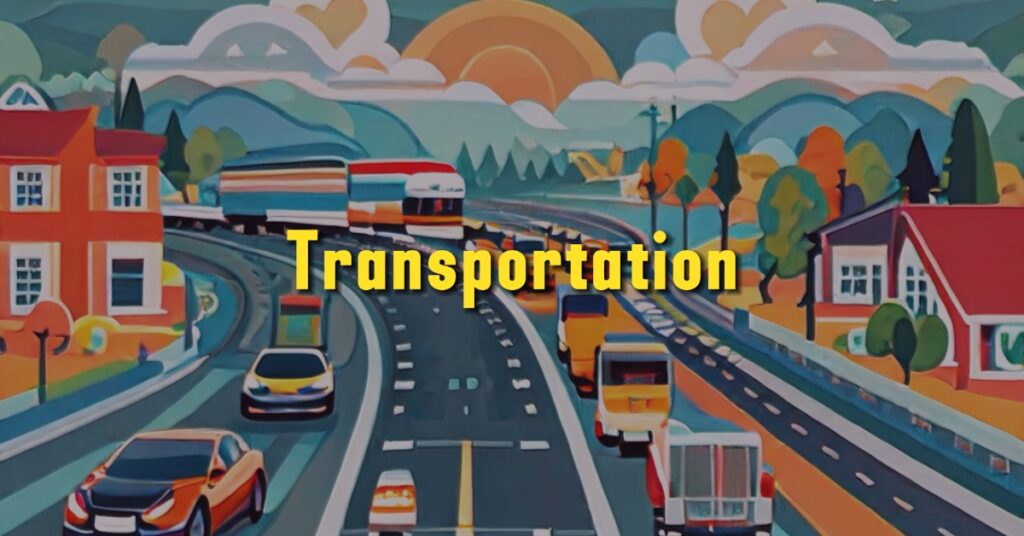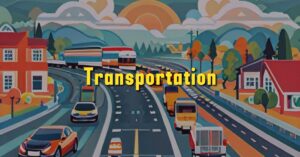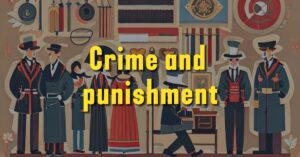This vocabulary list is for reference only. Your Lexical Resource scores are calculated based on the overall level of vocabulary used in your writing and speaking answers. To improve your Lexical Resource scores, it is necessary that you improve your overall level of vocabulary.
However, skillfully incorporating these words in your writing and speaking answers together with a good vocabulary level will increase the chance of enhanced Lexical Recourse scores.
Traffic Congestion in Cities
| Word/Phrase | Type | Meaning | Example |
|---|---|---|---|
| Alternative routes | Noun phrase | Secondary roads or paths used to avoid congestion | Drivers often seek alternative routes during peak traffic times. |
| Carpooling | Noun/Verb | Sharing a car with others for commuting | Carpooling helps reduce the number of vehicles on the road. |
| Commuter | Noun | Person who travels regularly to work or school | Many commuters use public transportation to avoid congestion. |
| Congestion | Noun | Blocked or overcrowded condition, especially in traffic | Traffic congestion is a major issue in urban areas. |
| Gridlock | Noun | Complete standstill of traffic | Gridlock during rush hour frustrates commuters. |
| Infrastructure | Noun | Basic physical and organizational structures and facilities | Improving infrastructure can alleviate traffic congestion. |
| Road capacity | Noun phrase | Maximum number of vehicles a road can handle | Increasing road capacity can improve traffic flow in cities. |
| Traffic bottleneck | Noun phrase | Point where traffic is forced to slow down or stop | Addressing bottlenecks is crucial for easing congestion. |
| Traffic flow | Noun phrase | Movement of vehicles on roads | Smooth traffic flow is essential for reducing congestion. |
| Traffic management | Noun phrase | Strategies and systems to regulate traffic flow | Effective traffic management reduces congestion and delays. |
| Urban sprawl | Noun | Unplanned and haphazard growth of urban areas | Urban sprawl contributes to increased traffic congestion. |
Public Transportation vs. Private Vehicles
| Word/Phrase | Type | Meaning | Example |
|---|---|---|---|
| Accessibility | Noun | Ease of use and availability | Public transportation improves accessibility for all citizens. |
| Carbon footprint | Noun phrase | Measure of greenhouse gas emissions | Using public transit reduces individuals’ carbon footprints. |
| Car ownership | Noun phrase | Possessing a vehicle for personal use | Public transit can reduce the need for individual car ownership. |
| Commuting time | Noun phrase | Time spent traveling to work or school | Public transit can reduce commuting time compared to driving. |
| Cost-effective | Adjective | Providing good value for the cost | Using public transit can be more cost-effective than driving. |
| Environmental impact | Noun phrase | Effects on the environment caused by transportation | Public transit has a lower environmental impact than private vehicles. |
| Fare system | Noun phrase | Structure of pricing for public transportation | The fare system influences people’s choice of transportation. |
| Mass transit | Noun phrase | Transportation system designed to move large numbers of people efficiently | Mass transit reduces traffic congestion and pollution. |
| Reliability | Noun | Consistency and dependability | Public transportation reliability is important for commuters. |
| Transit-oriented development | Noun phrase | Planning that focuses on public transit access and development | Transit-oriented development promotes walkability and public transportation use. |
| Public transportation | Noun phrase | System of buses, trains, and other vehicles used by the public | Public transportation is often more cost-effective than private vehicles. |
Sustainable Transportation Solutions
| Word/Phrase | Type | Meaning | Example |
|---|---|---|---|
| Active transportation | Noun phrase | Modes of travel powered by human energy, such as walking or cycling | Active transportation promotes physical activity and reduces emissions. |
| Bike-sharing | Noun phrase | System where bicycles are available for shared use | Bike-sharing programs promote sustainable urban mobility. |
| Car-free zones | Noun phrase | Areas where private vehicles are not permitted | Car-free zones improve air quality and reduce congestion. |
| Electrification | Noun | Conversion of vehicles or systems to use electric power | Electrification of public transit reduces carbon emissions. |
| Green infrastructure | Noun phrase | Infrastructure designed to improve environmental sustainability | Green infrastructure includes bike lanes and green spaces. |
| Hybrid vehicles | Noun phrase | Vehicles with both electric and combustion engines | Hybrid vehicles offer a bridge to more sustainable transportation. |
| Pedestrian-friendly | Adjective | Designed to accommodate pedestrians and walking | Pedestrian-friendly cities encourage walking and cycling. |
| Public transportation | Noun phrase | System of buses, trains, and other vehicles used by the public | Public transportation is often more cost-effective than private vehicles. |
| Transit-oriented planning | Noun phrase | Urban planning focused on public transit accessibility and efficiency | Transit-oriented planning aims to reduce car dependency in cities. |
| Zero-emission vehicles | Noun phrase | Vehicles that produce no tailpipe emissions | Zero-emission vehicles contribute to sustainable transportation. |
Idioms for speaking
| Idiom | Definition | Example |
|---|---|---|
| Catch the bus/train/flight | To board and travel on a bus, train, or airplane. | “I need to leave early to catch the bus to work.” |
| Full speed ahead | To proceed at maximum speed or with full force. | “With the green light, the driver went full speed ahead on the highway.” |
| Hit the road | To begin a journey or set out on a trip, especially by car. | “After breakfast, we hit the road to start our cross-country road trip.” |
| Off the beaten path | A location or route that is not well-known or frequently traveled. | “We prefer to explore off the beaten path destinations to experience unique cultures.” |
| On the road | Traveling or journeying, especially by vehicle. | “He’s constantly on the road for business trips.” |
| Road trip | A journey or trip taken by car, often for leisure or exploration. | “We’re planning a road trip along the coast for our summer vacation.” |
| Traffic jam | A situation in which a large number of vehicles are unable to move or are moving very slowly. | “We were stuck in a traffic jam for over an hour during rush hour.” |
| Take the wheel | To assume control or responsibility for driving a vehicle. | “He’s tired; let’s switch drivers, and you can take the wheel.” |
| Watch the road | To pay attention to driving and be cautious while on the road. | “It’s important to watch the road and avoid distractions while driving.” |
Traffic Congestion in Cities
Alternative routes
Type: Noun phrase
Meaning: Secondary roads or paths used to avoid congestion
Example: Drivers often seek alternative routes during peak traffic times.
Carpooling
Type: Noun/Verb
Meaning: Sharing a car with others for commuting
Example: Carpooling helps reduce the number of vehicles on the road.
Commuter
Type: Noun
Meaning: Person who travels regularly to work or school
Example: Many commuters use public transportation to avoid congestion.
Congestion
Type: Noun
Meaning: Blocked or overcrowded condition, especially in traffic
Example: Traffic congestion is a major issue in urban areas.
Gridlock
Type: Noun
Meaning: Complete standstill of traffic
Example: Gridlock during rush hour frustrates commuters.
Infrastructure
Type: Noun
Meaning: Basic physical and organizational structures and facilities
Example: Improving infrastructure can alleviate traffic congestion.
Road capacity
Type: Noun phrase
Meaning: Maximum number of vehicles a road can handle
Example: Increasing road capacity can improve traffic flow in cities.
Traffic bottleneck
Type: Noun phrase
Meaning: Point where traffic is forced to slow down or stop
Example: Addressing bottlenecks is crucial for easing congestion.
Traffic flow
Type: Noun phrase
Meaning: Movement of vehicles on roads
Example: Smooth traffic flow is essential for reducing congestion.
Traffic management
Type: Noun phrase
Meaning: Strategies and systems to regulate traffic flow
Example: Effective traffic management reduces congestion and delays.
Urban sprawl
Type: Noun
Meaning: Unplanned and haphazard growth of urban areas
Example: Urban sprawl contributes to increased traffic congestion.
Public Transportation vs. Private Vehicles
Accessibility
Type: Noun
Meaning: Ease of use and availability
Example: Public transportation improves accessibility for all citizens.
Carbon footprint
Type: Noun phrase
Meaning: Measure of greenhouse gas emissions
Example: Using public transit reduces individuals’ carbon footprints.
Car ownership
Type: Noun phrase
Meaning: Possessing a vehicle for personal use
Example: Public transit can reduce the need for individual car ownership.
Commuting time
Type: Noun phrase
Meaning: Time spent traveling to work or school
Example: Public transit can reduce commuting time compared to driving.
Cost-effective
Type: Adjective
Meaning: Providing good value for the cost
Example: Using public transit can be more cost-effective than driving.
Environmental impact
Type: Noun phrase
Meaning: Effects on the environment caused by transportation
Example: Public transit has a lower environmental impact than private vehicles.
Fare system
Type: Noun phrase
Meaning: Structure of pricing for public transportation
Example: The fare system influences people’s choice of transportation.
Mass transit
Type: Noun phrase
Meaning: Transportation system designed to move large numbers of people efficiently
Example: Mass transit reduces traffic congestion and pollution.
Reliability
Type: Noun
Meaning: Consistency and dependability
Example: Public transportation reliability is important for commuters.
Transit-oriented development
Type: Noun phrase
Meaning: Planning that focuses on public transit access and development
Example: Transit-oriented development promotes walkability and public transportation use.
Public transportation
Type: Noun phrase
Meaning: System of buses, trains, and other vehicles used by the public
Example: Public transportation is often more cost-effective than private vehicles.
Sustainable Transportation Solutions
Active transportation
Type: Noun phrase
Meaning: Modes of travel powered by human energy, such as walking or cycling
Example: Active transportation promotes physical activity and reduces emissions.
Bike-sharing
Type: Noun phrase
Meaning: System where bicycles are available for shared use
Example: Bike-sharing programs promote sustainable urban mobility.
Car-free zones
Type: Noun phrase
Meaning: Areas where private vehicles are not permitted
Example: Car-free zones improve air quality and reduce congestion.
Electrification
Type: Noun
Meaning: Conversion of vehicles or systems to use electric power
Example: Electrification of public transit reduces carbon emissions.
Green infrastructure
Type: Noun phrase
Meaning: Infrastructure designed to improve environmental sustainability
Example: Green infrastructure includes bike lanes and green spaces.
Hybrid vehicles
Type: Noun phrase
Meaning: Vehicles with both electric and combustion engines
Example: Hybrid vehicles offer a bridge to more sustainable transportation.
Pedestrian-friendly
Type: Adjective
Meaning: Designed to accommodate pedestrians and walking
Example: Pedestrian-friendly cities encourage walking and cycling.
Public transportation
Type: Noun phrase
Meaning: System of buses, trains, and other vehicles used by the public
Example: Public transportation is often more cost-effective than private vehicles.
Transit-oriented planning
Type: Noun phrase
Meaning: Urban planning focused on public transit accessibility and efficiency
Example: Transit-oriented planning aims to reduce car dependency in cities.
Zero-emission vehicles
Type: Noun phrase
Meaning: Vehicles that produce no tailpipe emissions
Example: Zero-emission vehicles contribute to sustainable transportation.
Idioms for Speaking
Catch the bus/train/flight
Definition: To board and travel on a bus, train, or airplane.
Example: “I need to leave early to catch the bus to work.”
Full speed ahead
Definition: To proceed at maximum speed or with full force.
Example: “With the green light, the driver went full speed ahead on the highway.”
Hit the road
Definition: To begin a journey or set out on a trip, especially by car.
Example: “After breakfast, we hit the road to start our cross-country road trip.”
Off the beaten path
Definition: A location or route that is not well-known or frequently traveled.
Example: “We prefer to explore off the beaten path destinations to experience unique cultures.”
On the road
Definition: Traveling or journeying, especially by vehicle.
Example: “He’s constantly on the road for business trips.”
Road trip
Definition: A journey or trip taken by car, often for leisure or exploration.
Example: “We’re planning a road trip along the coast for our summer vacation.”
Traffic jam
Definition: A situation in which a large number of vehicles are unable to move or are moving very slowly.
Example: “We were stuck in a traffic jam for over an hour during rush hour.”
Take the wheel
Definition: To assume control or responsibility for driving a vehicle.
Example: “He’s tired; let’s switch drivers, and you can take the wheel.”
Watch the road
Definition: To pay attention to driving and be cautious while on the road.
Example: “It’s important to watch the road and avoid distractions while driving.”











